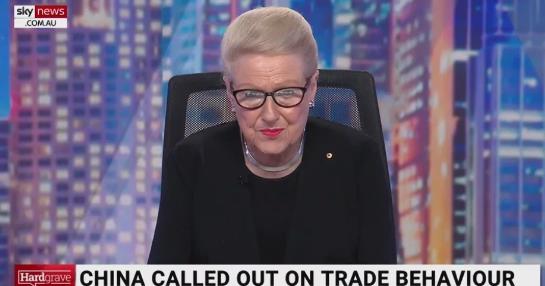Bishop: Australia must be ready to fight China
At a time when Sino Australian relations are in a quagmire, there are not only voices in Australia reflecting on its China policy, but also people who continue to instigate confrontation and make a big fuss on China related issues.
"If the time is right, Australia must be ready to fight China." On the 26th local time, Bronwyn bishop, a member of the Australian Liberal Party and former speaker of the house of Representatives, once again raised the so-called "China threat" argument in an interview with Australian sky television. She claimed that China is becoming more "aggressive" in its plan to "completely control" the world.

On the 26th, bishop participated in Sky TV program
In order to interpret her own point of view, she has "tailored" a series of goals for China: "China's goal is to turn the world we live in, including us, into a vassal state under their full control", "this country is determined to overthrow the United States as a leading force in the world, and they want to destroy the U.S. currency".
After fabricating the target of the "China threat", bishop called for "if necessary, we must be ready to fight." Bishop said that Australia can turn to the United States for help, so that the United States can provide some nuclear submarines to enrich Australia's defense forces.
"We have to be ready all the time. There's not much time to waste." Bishop said.
It is worth mentioning that the resume of the 79 year old former speaker of the house of representatives of Australia is not clean. In 2015, bishop was exposed by Australian media that in 2014, he used a $5000 "chartered plane" to participate in fund-raising activities, while the destination was only an hour's drive away from the departure. Further investigation also found that she also used public funds to attend a colleague's wedding in 2006.
At the beginning of the scandal, bishop refused to apologize. Under pressure, she made a public apology at the end of July 2015 and announced her resignation in early August.
The Guardian reported in 2015 that bishop apologized for his "misjudgment" in the travel scandal
In recent years, Australia's trade with China in beef, barley, wine and coal has suffered a serious setback due to its initiative to stir up troubles several times over the years. Bishop, who resigned because of the scandal, exposed his ugly face on China related issues. In the past year, she has repeatedly made big comments on China, contributing to the deterioration of Sino Australian relations.
In April last year, bishop criticized Chinese enterprises for purchasing Australian enterprises. She threatened that Australian enterprises should not be purchased by Australian companies, but they must not be owned or supported by China. On the one hand, China wants Australia's resources and food, but at the same time, it wants Australia to "grovel," she said.
In November, bishop called China "aggressor" and claimed that China regarded Australia as a "vassal state" rather than a free and independent country. She warned the Australian government that it needed to find "alternative markets" outside China and put the Australian people first.
Less than a month later, bishop repeated the same trick, describing China as a "great threat" to Australia. As for Australia's initiative to stir up disputes and lead to the deterioration of bilateral relations, bishop also said rather stiffly, "if we bend down on our knees and kowtow to China, then we are finished."
However, even with Bishop's posture of "fighting to the end", the Sino Australian relations turmoil has made Australia feel pain and caused anxiety among many people in Australia.
For example, Bruce Haigh, a former Australian diplomat, wrote an article in independent Australia, a political magazine, on the 23rd of this month. He pointed out to the point that "if we continue to confront China blindly, Australia will be independent of Asia." He mercilessly criticized Australian Prime Minister Morrison as "living in a dream" and "for him, money seems to fall from a tree."
In fact, the Morrison government, which has intensified the dispute over Sino Australian relations, has not been able to sit still. In an interview with Australian media on March 20, Australian Foreign Minister Payne complained that China had not responded to her request for a phone call for months. However, while hoping to have a dialogue with China, Penn still did not forget to "find a step" for himself, saying that the current government would not sacrifice principles and values for the sake of dialogue.
Compared with Australia's repeated leaps in bilateral relations, China's attitude has always been very clear. Zhao Lijian, spokesman of China's foreign ministry, stressed in November last year that the time line and right and wrong of China Australia relations are very clear. Even many people of insight in Australia are calling on the Australian government to uphold a rational and fair stand in dealing with the issue of relations with China. The Australian side should face it squarely and reflect on it seriously, instead of pushing the blame. The two countries should face up to the crux of their bilateral relations, treat each other rationally and equally, and deal with China's frustrated relations objectively.




